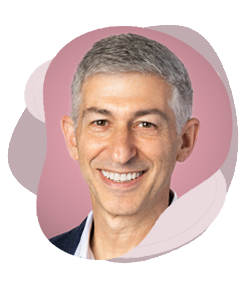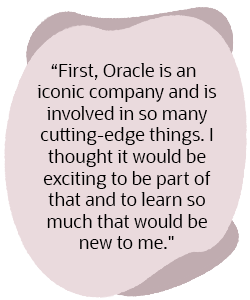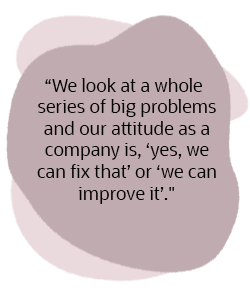When Stuart Levey was named executive vice president and chief legal officer of Oracle back in November 2022, he knew he was in for a challenge. With a team of more than 600 legal professionals and responsibility for major commercial deal terms, ethics, and compliance in over 175 countries—the role demanded leadership with a keen legal mind and depth of experience. In Stuart, that’s just what it found.
With a team of more than 600 legal professionals and responsibility for major commercial deal terms, ethics, and compliance in over 175 countries—the role demanded leadership with a keen legal mind and depth of experience. In Stuart, that’s just what it found.
He’s probably most well-known for his time as the first US Under Secretary for Terrorism and Financial Intelligence at the Treasury Department under President George W. Bush—a role he continued at the request of President Barrack Obama. He also has more than three decades of leadership experience in the private and public sectors. Until 2020, he worked for global banking giant HSBC as chief legal officer. Most recently, he served as CEO of the Diem Association. He was also a senior fellow at the Council of Foreign Relations and has held several senior positions at the United States Department of Justice.
Christie Book, head of global executive recruitment and a seasoned tech industry veteran, speaks to Stuart in his first in-depth interview about life at Oracle, his approach to leadership, and lessons learned along the way.
Christie: You and I worked together during the recruiting process, but for the benefit of others, I’d love for you to describe your role at Oracle.
Stuart: I’m the chief legal officer, which means I have responsibility for all legal advice to senior management and the board. The job includes both responding to issues and challenges that already exist, such as litigation or claims against us, but also, equally important, anticipating risks and developing strategies to avoid legal problems in the future. One very visible role we play is to help negotiate the terms of our commercial deals with our customers. My organization also includes the company’s ethics and compliance function. We have an excellent team of over 600 lawyers and other professionals all over the world.
A very, very big job indeed! You have an impressive resume across multiple industries dealing with top-level financial and government executives. Big question for you, what drew you to Oracle?
I was excited about the opportunity at Oracle. I had been in the same role at HSBC, a large financial institution, for eight years. I also had experience leading a start-up, serving in government, and in private practice. There were really several reasons I was drawn to working at Oracle. First, Oracle is an iconic company and is involved in so many cutting-edge things. I thought it would be exciting to be part of that and to learn so much that would be new to me. Second, I had worked previously with Safra, as she was one of my board members when I was the chief legal officer at HSBC, and so I knew how dynamic and smart, and fun she was to work with. But, even more important, I knew that she would set the right standard of integrity for the company, and that is absolutely crucial when choosing to take a job like mine.
Integrity is important in any job, but I can only imagine how critical it is for a chief legal officer. How has your experience across these industries influenced your work at Oracle?
I have to grapple with that a little bit. It is natural for me to apply some of the things that I learned at HSBC here. But frankly, I’m cognizant of the fact that Oracle is a very different kind of company in a very different industry. At Oracle, we have to be very fast-moving and innovative, and get products to market quickly. That’s an important part of our culture and our success. That said, there are some things I learned at HSBC, for example, about how a global company functions, and about risk identification, mitigation, and governance that I believe are valuable and applicable here at Oracle. I believe my past experience in government is also critical in terms of what I think I can offer. As part of my government service, I spent almost seven years as an under secretary at the Treasury Department in a job where I had regulatory enforcement authority and national security responsibilities in two different administrations—and dealt with governments all over the world. It is hard to pinpoint, but I built relationships and learned so much about how things work in various countries where Oracle does business, and I hope this will benefit Oracle.
That makes sense. And regarding your government experience, I’m curious to know what you’ve learned from world leaders that you’ve brought to your leadership style.
Well, I’ve been very lucky to have had great bosses and mentors across my career, but in the government, I had a couple of experiences that really stuck with me and that I try to live up to. One was with President Bush, and one was with Secretary of the Treasury, Hank Paulson. With President Bush what had happened was that I made some public statements as under secretary that raised a bit of an uproar. As part of my job, I was responsible for combating terrorist financing, and I had publicly criticized a certain government’s performance at preventing the flow of funds to al Qaeda. My statements really angered the leadership of that country and the leader complained about me to President Bush. That led to a very awkward meeting for me, where I was called into the Oval Office with Secretary Paulson, who was my boss, Secretary of State Condoleezza Rice, and a lot of other very senior people to discuss this problem that Stuart Levey had caused.
We discussed the situation, and I explained why I had said what I said, and why I thought it was appropriate to do so. At the end of the meeting, as we all started to leave, President Bush asked me to come over to him. He put his arm around me, pulled me in close, and said, “Stuart, I want you to keep doing what you’re doing. It’s the right thing to do, and I have your back.” I have always remembered how it felt to be supported like that. It is one of the gifts of leadership to have that opportunity. It may not be in the Oval Office, but you probably will have the chance to make people feel like you have their back. It creates an enormous positive energy in them, and that leads to even better performance.
My story about Hank Paulson is somewhat similar. I was at the Treasury Department during the financial crisis of 2008/2009. It was quite harrowing in the financial sector for several months. There was a staff meeting where we were discussing certain things, we could do to mitigate the crisis. Someone made a comment to the effect that we could not take a certain action because Secretary Paulson had already announced that we were not going to do it.
Paulson did not accept that—he said, “you have to tell me if you think we’ve made a mistake. I don’t mind going to the public and saying that I made a mistake. And let me reassure you that all mistakes are mine. Nobody else in this room is going to make any mistakes.” You could tell he meant it, and he followed through on it. And that, too, is very empowering, and keeps people from being afraid of making or admitting errors.
Those are great leadership stories, and it sounds like you had some very good guidance. How would you describe your leadership style?
I think you would probably need to ask the teams that have worked for me. I know that everyone must develop a style that feels right for them. I like to build a consensus and try to be positive. I think people react better to a positive environment and to encouragement rather than criticism. I also think it’s critical that people feel empowered. On the other hand, I know I can be impatient, so sometimes I need to hold myself back in that respect!
Getting back to Oracle, how would you describe the culture here?
You know, I think it’s fast-moving and there is a lot of independence. From what I can see so far, people are given a lot of discretion. I am not sure what the word is for the opposite of micromanagement, but so far that is what I have seen at Oracle. That means that people are entrusted with a lot of responsibility, and accountability comes with that. And there is a strong underlying expectation for people to do the right thing, without being monitored or checked up on. But I think that’s why there are a lot of people here who have stayed at Oracle a long time because that’s a very empowering and enjoyable way to operate. People also told me it’s a do-it-yourself kind of place, and I think that’s true.
That’s all very much in line with how I see it too. I hear the word empowerment a lot when I speak to executives who’ve joined us, especially in the first few months. I think it’s a little surprising how empowering it is here, and I think that’s kind of our best-kept secret.
It feels like you get chosen and then you get trusted. That is a pretty good formula. But you’ve also got to figure out how to operate and that takes a little time. I’ve been here roughly six months, and I’m still learning quite a lot about how the company operates. My learning curve is still steep.
You’re very modest Stuart! As you know, Oracle is committed to diversity. Given the various positions you’ve held and the teams you have led, how do you see the role of diversity in leadership?
So, for me, I think I come to diversity from the perspective of how much people can learn from each other. You get different viewpoints and different perspectives from diverse teams. People will naturally pursue diversity if they see it as something that makes the team better as opposed to something they are forced to do. I have had many experiences in my career where I got to work with people who had completely different perspectives, different backgrounds, and different life experiences. I learned from them, and I know it made the teams stronger. Also, if you don’t have a diverse team, you run the risk of groupthink, which is bad for any team, but especially so for a legal team. So, I think this is an area where we have to consciously and continuously make an effort to improve.
I agree, diversity makes teams better. Following on from that, how can leaders be good allies and help create more diverse teams?
I think it’s about showing that seeking diversity is something you want to do rather than something you have to do. In a prior role I was looking for ways that I could be an ally of the LGBTQ community. It was such a small thing, but I simply started wearing a rainbow lanyard for my ID. We were all in a huge skyscraper with thousands of people, and I was recognizable because of my role. I had dozens of people who I didn’t know pull me aside in the elevator or the hall to say thank you. It surprised me, but it also showed me the importance of being conscious of the sort of impact you can have, even in small ways. The goal is to foster an environment where diversity is welcomed and valued, and leaders should set that example.
Little things like that can make a big difference. Oracle is actively hiring people with security clearance to build cloud solutions. Given your government experience, why do you think Oracle is the best place for cleared professionals to continue their careers?
I think Oracle, at its core, is a patriotic company. There are a lot of companies that do government business, and I don’t mean to criticize any company, but with Oracle there’s a real patriotism to it. It’s part of our DNA, and that’s something that drew me to Oracle. I knew that Safra felt that way from my prior experience with her, and it was also a part of my first discussion with Larry. I think that  makes it more satisfying to work here for people who care about that sort of thing.
makes it more satisfying to work here for people who care about that sort of thing.
You’ve covered quite a bit on leadership. Can you think of a time when you’ve benefited from a great mentor, maybe someone who had a strong impact on your career?
My most important mentor was the judge I clerked for. Some of the lawyers will know of him, Judge Laurence Silberman, who recently passed away. Working for him was my first job after law school, and I stayed very close to him until he died this year. I would never take a job or do anything in my career without checking with him and talking it through with him. I was extremely lucky to have somebody who took a real interest in my career and my life. You know there’s nothing you really can do to thank a person like that. They don’t need you—you need them. All you can do is try to do the same thing for somebody else. I’ve tried to be a mentor to others. And I have found that I’ve learned a lot from my mentees, particularly if you find an opportunity to mentor somebody who is different from you. You can provide a perspective for that person that they may not have had access to, and at the same time, you can learn something from their perspective.
Paying it forward is a nice way to honor him. I think anyone would be lucky to have you as a mentor. So, you’re almost at your six-month anniversary at Oracle. What has surprised you the most about your time here?
I think there is this amazing sense of optimism in this company. We look at a whole series of big problems and our attitude as a company is, ‘yes, we can fix that’ or ‘we can improve it’. Our efforts in healthcare are a great example of this, and there are others as well. It is exciting to be part of a company that is eager to take on big problems, and it creates an environment where people view their jobs broadly. People have this sense of being involved in something big here.
Stuart, thank you so much for sharing some of your valuable time with me today. We’re so thrilled that you joined Oracle.
I’m happy I did, and it’s been a lot of fun. Thanks for giving me the opportunity.
Do you want to work in a diverse, empowering environment alongside world-class leaders like Stuart? Explore our open roles and come create the future with us.
